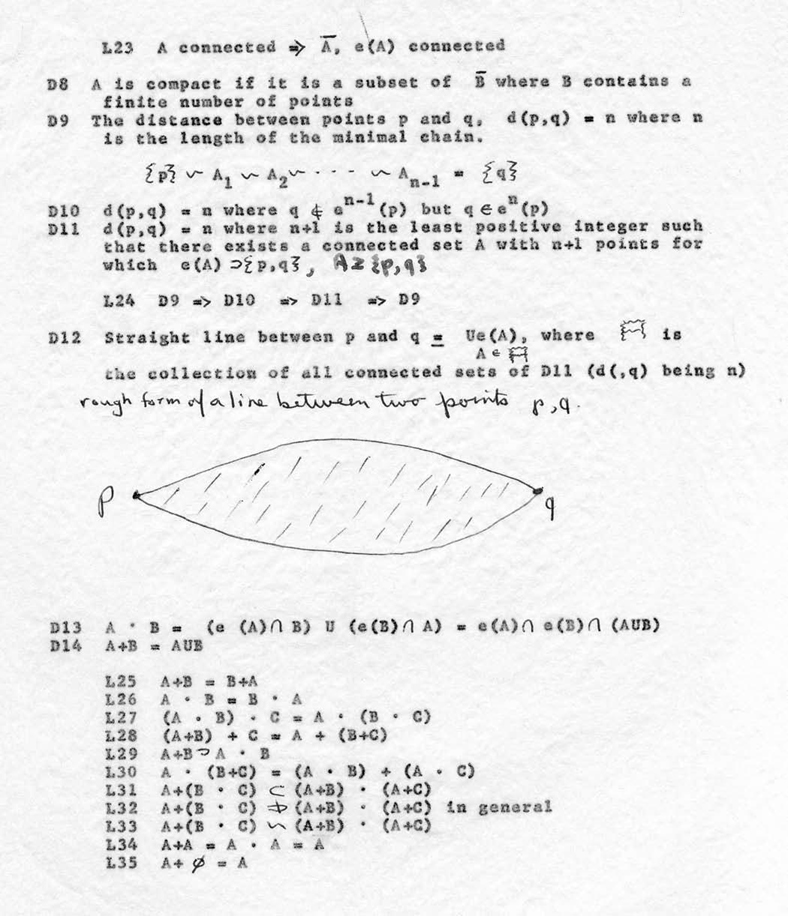- About MAA
- Membership
- MAA Publications
- Periodicals
- Blogs
- MAA Book Series
- MAA Press (an imprint of the AMS)
- MAA Notes
- MAA Reviews
- Mathematical Communication
- Information for Libraries
- Author Resources
- Advertise with MAA
- Meetings
- Competitions
- Programs
- Communities
- MAA Sections
- SIGMAA
- MAA Connect
- Students
- MAA Awards
- Awards Booklets
- Writing Awards
- Teaching Awards
- Service Awards
- Research Awards
- Lecture Awards
- Putnam Competition Individual and Team Winners
- D. E. Shaw Group AMC 8 Awards & Certificates
- Maryam Mirzakhani AMC 10 A Awards & Certificates
- Two Sigma AMC 10 B Awards & Certificates
- Jane Street AMC 12 A Awards & Certificates
- Akamai AMC 12 B Awards & Certificates
- High School Teachers
- News
You are here
Archives Spotlight: The Alfred Schild Papers
The Alfred Schild Papers
By Nikki Thomas
The following article, featured as part of the Archives of American Mathematics Spotlight, was published in the November 2006 issue of MAA FOCUS. The full issue is available here (pdf).

Undated portrait of Alfred Schild. (Click to enlarge.)
Source: The Alfred Schild Papers at the Archives of American Mathematics.
The Alfred Schild Papers at the Archives of American Mathematics (AAM) have recently been reorganized to make this extensive collection more accessible to researchers. Additionally, the archivists created a more detailed inventory of the papers, currently available on the AAM website, and completed preservation work that will ensure the collection's availability to researchers for many years to come.
Alfred Schild was a mathematical physicist specializing in relativity and gravitation. Born in Istanbul in 1921 to German parents, he received his primary education in England, but was sent to Canada during World War II, where he resumed his education at the University of Toronto, earning both his bachelor's and master's degrees. Schild also received his Ph.D. (1946) from the University of Toronto under the direction of Leopold Infeld.
He continued his career in mathematics as a professor at the Carnegie Institute of Technology and the University of Toronto before joining the faculty at the University of Texas at Austin in 1957, where he remained until his death in 1977.

Illustration used by Schild in a projective geometry lecture. (Click to enlarge.)
Source: The Alfred Schild Papers at the Archives of American Mathematics.
Schild was named one of the first Ashbel Smith professors in 1963 and co-founded the first Texas Symposium on Relativistic Astrophysics. He participated in founding the International Society on General Relativity and Gravitation, the Center for Particle Theory, the Center for Statistical Mechanics, the Center for Plasma Physics, and the Center for Relativity Theory at the University of Texas at Austin. A frequent visiting professor at universities around the world, Schild also enriched the University of Texas by bringing renowned physicists to visit the Center for Relativity Theory.
Physical-geometrical insight is evident throughout Schild's work, which concentrated on foundations of relativity, quantization, algebraically special solutions, and conformal techniques. His later research dealt particularly with Fokker action principles and string models of particles. The well-known Schild's ladder and Kerr-Schild spacetimes bear his name.

Schild's mathematical research notes on geometry without points. (Click to enlarge.)
Source: The Alfred Schild Papers at the Archives of American Mathematics.
Schild participated in faculty debates in support of students' and professors' freedom to learn, teach, and perform research, as well as their freedom of expression. He was politically active and especially known for his early opposition to the Vietnam War.
This collection consists of eighteen feet of notes and drafts for publications, seminar papers, lecture and teaching notes, grant proposals, literary productions, reprints, photographs, and a sound recording. There are notes, manuscripts, and correspondence relating to Schild's book Tensor Calculus (1949), coauthored with J.L. Synge. Major correspondents include P.A.M. Dirac and L. Infeld.
Most of the material is from Schild's years in Texas. The collection is especially strong in documenting the formation and activities of the Center for Relativity Theory and also includes records of his work in the founding and administration of the Texas Symposium on Relativistic Astrophysics and of his consulting work with the Gulf Research and Development Company.
Nikki Thomas was an archival assistant at the Archives of American Mathematics.
The Archives of American Mathematics (AAM) is a unit of the Dolph Briscoe Center for American History at the University of Texas at Austin. Individuals interested in conducting research or donating materials or who have general questions about the AAM should contact Carol Mead, Archivist: carolmead@austin.utexas.edu, (512) 495-4539.
Revised on July 12, 2010.




